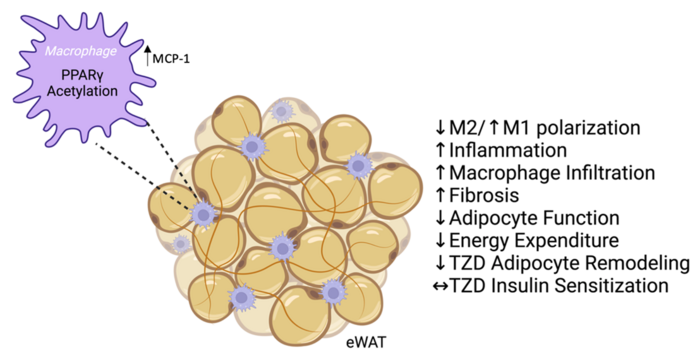As a chronic pro-inflammatory disease, obesity is closely associated with the development of various diseases such as type 2 diabetes, cardiovascular disease and cancers. Obesity is now a major concern for public health.

Credit: Nicole Aaron, Tarik Zahr, Ying He, Lexiang Yu, Brent Mayfield, Utpal B Pajvani, Li Qiang
As a chronic pro-inflammatory disease, obesity is closely associated with the development of various diseases such as type 2 diabetes, cardiovascular disease and cancers. Obesity is now a major concern for public health.
Macrophages have been known to play an important role in the development of obesity. Recent studies have shown that adipose tissue-resident macrophages respond to the intake of fat, and regulate fat storage in a paracrine fashion. Macrophages are no longer just a “player”, but a “culprit” in the development of obesity.
A growing body of evidence indicates that the nuclear receptor peroxisome proliferation-activated receptor γ (PPARγ) plays a leading role in the development and remodeling of adipose tissue. On the one hand, PPARγ is highly expressed in adipocytes and acts as a major regulator of adipocyte differentiation and function. On the other hand, PPARγ plays anti-inflammatory roles in macrophages, and deletion of PPARγ in macrophages impairs lipid metabolism. Although accumulating evidence showed close correlation among PPARγ, macrophages and lipid metabolism, how post-translational modifications of PPARγ in macrophages regulate adipose issue remains largely unknown.
In a recent study of Life metabolism, Li Qiang group at Columbia University revealed a novel role of PPARγ acetylation in macrophages in impairing adipose tissue function (Title: Acetylation of PPARγ in macrophages promotes visceral fat degeneration in obesity, https://academic.oup.com/lifemeta/advance-article/doi/10.1093/lifemeta/loac032/6821742).
They constructed a mouse line that expresses a macrophage-specific, constitutive acetylation-mimetic form of PPARγ (K293Qflox/flox:LysMcre, mK293Q) to systematically analyze the role of PPARγ acetylation in macrophages both in vitro and in vivo. Under high-fat diet (HFD) conditions, mK293Q mice showed a significant increase in M1-like macrophage infiltration in epididymal white adipose tissue (eWAT), and a significant decrease in M2 polarization of macrophage, partially through Mcp1-mediated mechanisms. Metabolic and phenotypic analysis revealed that macrophage PPARγ acetylation decreased energy expenditure and exacerbated weight and fat accumulation during HFD, impairing insulin sensitivity and glucose tolerance. Further testing of metabolic indicators in the plasma of mK293Q mice revealed decreased expression of Adiponectin and Adipsin, two key adipose-secreting factors regulating systemic insulin sensitivity and glucose homeostasis, and impaired expression of genes related to adipocyte function in eWAT, as well as an overall impairment of lipid metabolism. Notably, the adipose tissue of mK293Q mice showed severe fibrosis. Thus, PPARγ acetylation in macrophages promotes macrophage infiltration, causing adipose fibrosis and dysfunction and aggravating hepatic steatosis with HFD feeding.
PPARγ synthesis activator thiazolidinediones (TZDs) are an important class of anti-diabetic drugs which inhibit the inflammatory response of macrophages and alleviate adipose tissue inflammation in vivo. In this study, the TZD drug Rosiglitazone (Rosi) was used to treat mK293Q mice after HFD feeding. The results showed that, although Rosi could to some extent rescue insulin resistance and impaired glucose tolerance in mK293Q mice, the response of eWAT to TZD drugs was compromised. Macrophage infiltration, the expression of inflammatory and anti-inflammatory factors, and the expression of adipocyte functional genes were not fully restored. In conclusion, PPARγ deacetylation in macrophages is critical for the remodeling and functional improvement of visceral adiposity in response to TZD.
Taken together, this study for the first time explores the role of macrophage PPARγ acetylation in determining adipose tissue remodeling, providing a novel mechanism of PPARγ acetylation-mediated crosstalk among multiple cells in adipose tissue.
Reference: Nicole Aaron et al. (2022). Acetylation of PPARγ in macrophages promotes visceral fat degeneration in obesity. Life Metabolism. https://doi.org/10.1093/lifemeta/loac032.
###
About Higher Education Press
Founded in May 1954, Higher Education Press Limited Company (HEP), affiliated with the Ministry of Education, is one of the earliest institutions committed to educational publishing after the establishment of P. R. China in 1949. After striving for six decades, HEP has developed into a major comprehensive publisher, with products in various forms and at different levels. Both for import and export, HEP has been striving to fill in the gap of domestic and foreign markets and meet the demand of global customers by collaborating with more than 200 partners throughout the world and selling products and services in 32 languages globally. Now, HEP ranks among China’s top publishers in terms of copyright export volume and the world’s top 50 largest publishing enterprises in terms of comprehensive strength.
About Life Metabolism
Life Metabolism is a fully open access, peer-reviewed journal that publishes one volume per year online, providing a platform for the publication of works of high significance and broad interest in all areas of metabolism. Life Metabolism welcomes several different article types, including original article, review article, research highlight, letter, editorial, perspective, and so on. Once a paper is accepted, Life Metabolism can publish a precopyedited, preproofed version of the paper online within 48 hours of receiving a signed licence, and this will be replaced by a copyedited, proofed version of the paper as soon as it is ready. The Editors-in-Chief are professors Peng Li at Tsinghua University and John R Speakman at University of Aberdeen, UK. In the first three years, there will be no publication costs for publishing in Life Metabolism, and Open Access fees will be waived.
Journal
Life Metabolism
DOI
10.1093/lifemeta/loac032
Method of Research
Experimental study
Subject of Research
Animal tissue samples
Article Title
Acetylation of PPARγ in macrophages promotes visceral fat degeneration in obesity
Article Publication Date
11-Nov-2022




